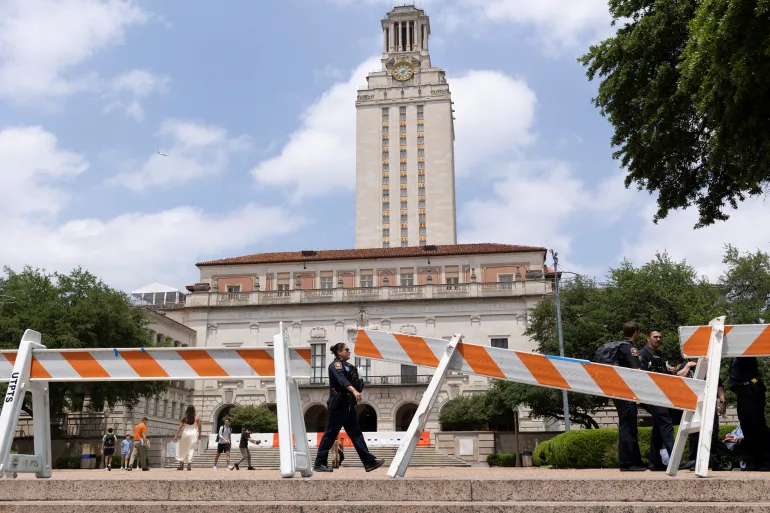In Austin, Texas, Alishba Javaid, a student at the University of Texas at Austin, described the surreal moment when approximately 30 state troopers appeared on campus during a walkout against Israel’s war in Gaza.
Joined by hundreds of classmates on the grass near the campus’s towering limestone structure, they sought divestment from companies supplying weapons to Israel. However, the peaceful protest turned tense as troopers in riot gear increased in number, causing fear among the demonstrators. Eventually, numerous students were arrested as law enforcement attempted to disperse the crowd, leading to widespread online coverage of the clashes.
Texans face a distinct challenge, grappling with a far-right state government that has aimed to curtail protests against Israel. Governor Greg Abbott signed a law in 2017 prohibiting government entities from collaborating with businesses boycotting Israel, with subsequent efforts to bolster the legislation. Abbott has labeled the protests as “hate-filled” and “anti-Semitic,” perpetuating misconceptions about the demonstrators.
Furthermore, a state law enacted earlier this year compelled public universities to close their diversity, equity, and inclusion (DEI) offices. This move, criticized by numerous students and employees, has diminished safety for people of color on campuses, leading to the departure of staff DEI advocates.
‘Using violence to subvert minorities’
At University of Texas campuses, the protests persist amidst ongoing violence. On the last day of classes, April 29, police resorted to pepper spray and flash-bang devices to disperse a crowd at the Austin campus. Many students were encircled by troopers and forcibly removed, resulting in screams and chaos.
Hiba Faruqi, a 21-year-old student, recounted being knocked over during a confrontation between students and police, causing her knee to bleed. Despite her injuries, she considers herself fortunate to have avoided more severe harm. She expressed disbelief that the university had summoned state troopers and then had to provide medical assistance to injured students.
Faruqi highlighted an unspoken racist and xenophobic undertone in the situation, noting a disproportionate number of brown protesters, which she believes may influence police tactics.
Amidst ongoing calls for divestment, students, lawyers, and advocates face skepticism and hostility from the Texas government. Faruqi emphasized Texas’s history of using violence against minorities but noted a shift in public perception, as traditional tactics fail to quell dissent.
Protests at the University of Texas have honed in on the institution’s endowment, the largest public education fund in the US, valued at over $40 billion. Investments in companies with ties to Israel, particularly in defence, have sparked demonstrations calling for divestment.
Fatima, among the protesters, underscores the gravity of the situation, citing the death toll in Gaza and the university’s investment in weapon manufacturers supplying Israel. Arrests during protests have led to solidarity efforts, with community members offering support and supplies.
Anissa Jaqaman, an activist, emphasizes the importance of solidarity and healing in the movement. Despite challenges in raising awareness about Palestine, she remains steadfast in her advocacy, wearing her keffiyeh scarf as a symbol of solidarity.
Students like Alishba Javaid grapple with the aftermath of protests, balancing academic pursuits with activism. They feel a responsibility to address social justice issues, despite uncertainties about the future in Texas. Javaid expresses a commitment to making a difference, recognizing the need for collective action in effecting change.










